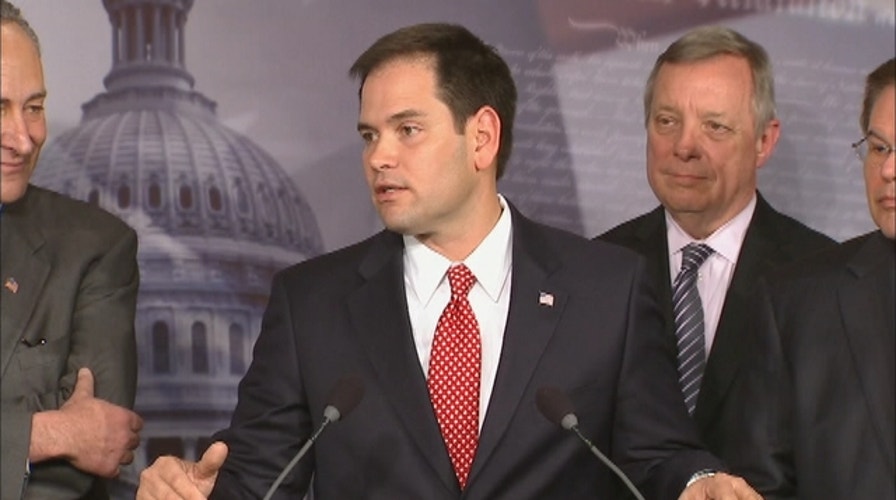Immigration Reform Presser: Marco Rubio
A bipartisan group of eight leading senators — including Marco Rubio of Florida and New Jersey’s Robert Menendez — have reached a tentative deal on a systematic overhaul of the country’s immigration system.
Advocates of more lenient immigration policies say they feel more optimistic than ever that Congress will pass legislation that will help millions of undocumented immigrants eventually become U.S. citizens.
But their optimism, sparked by a bipartisan immigration reform proposal by eight of the U.S. Senate’s most influential members – four Republicans and four Democrats – to be unveiled Monday afternoon, also carries concerns and questions.
“There’s momentum this time around,” said Kica Matos, Director of Immigrant Rights and Racial Justice at the Center for Community Change in New Haven, Conn.
Immigration-restriction groups acknowledged immigrant advocates are riding a wave now — but they vowed nonetheless to fight what they deem is a veiled, large-scale amnesty.
Latinos turned out in record numbers to vote in the presidential election in November – with 7 out of 10 voting for President Barack Obama.
Their overwhelming support for the president was attributed in great part to the harsh rhetoric on immigration by many Republicans, especially during the GOP primaries last year. Obama is expected to unveil his own plan for comprehensive immigration reform on Tuesday in Las Vegas – the move prompted senators to move quicker than expected this week to beat the president’s announcement, according to published reports.
“We have senators, we have the president unveiling his plan tomorrow, and the grassroots is gearing up to move this forward this year,” Matos said. “And consensus is on our side – a growing number of Americans realize this broken system has led to 11 million people in this country without documents. We have a mess on our hands, we need to fix it.”
Groups that favor strict immigration enforcement assailed the plan to give undocumented immigrants a path to legalization – reserving particularly harsh criticism for Republican senators —including Florida’s Marco Rubio — as sell-outs.
“The plan is supposedly the result of three years of closed door negotiations by a group of pro-amnesty senators,” said a statement by the Federation for American Immigration Reform, or FAIR, the country’s leading anti-illegal immigration lobby group, “without any input from the American people or any examination of how amnesty or the continued expansion of legal immigration at all levels affects the U.S. labor market.”
Politicians are basically just looking out for themselves, they argue, selling to the highest bidder in order to stay in office.
“It is abundantly clear from the Senate group’s amnesty framework and their tactics that their interests continue to be those of illegal aliens and their own political ambitions, not American workers,” the group said in its statement.
The bipartisan proposal pivots on four pillars, according to a statement put out by the senators. They include: creating a path to eventual citizenship for undocumented immigrants, reforming the legal immigration system to address needs “in the American economy and strengthen American families,” creating an employment verification system to crack down on hiring of undocumented workers and revamp the guest worker program.
The senators include, besides Rubio, Democrats Charles Schumer, of New York, Robert Menendez, of New Jersey, Richard Durbin, of Illinois, Michael Bennett, of Colorado, and Republicans John McCain, of Arizona, Jeff Flake, of Arizona, and Lindsey Graham, of South Carolina.
A poll released Monday by Fox News shows a majority of American voters believes undocumented immigrants should be given a chance to apply for citizenship, as long as they meet certain requirements.
The poll asked voters what government policy should be toward undocumented immigrants currently in the U.S. Two thirds – 66 percent -- think there should be a path to citizenship, but only if the individual meets requirements such as paying back taxes, learning English and passing a background check.
Undocumented immigrants are expressing hope that they may soon be able to come out of the shadows.
Federico Paseiro, a 19-year-old undocumented immigrant from Argentina who lives in South Florida, said that the new proposal – and the president’s expected announcement Tuesday – “is a step in the right direction in trying to help us.”
“This shows that we’re moving forward as a society and a nation,” said Paseiro, who was given a two-year break from deportation under a new program meant for immigrants who were brought into the country illegally as youngsters.
But a temporary break is not a guarantee of eventual legalization — plus he’s afraid for his parents, who are still in the country illegally.
“It’s difficult to know that I cannot be deported, but my parents still can be,” said Paseiro, whose family came in 2000, when he was 7, on tourist visas.
Among the chief concerns immigration advocates have about the proposal is its emphasis on tighter enforcement as a condition for providing a pathway to legalization. They say the Obama administration has stressed enforcement more than any other, deporting a record number of immigrants.
“For the past twenty-five years, our nation's immigration policy has been enforcement-heavy only,” said Angelica Salas, executive director for the Coalition for Humane Immigrant Rights of Los Angeles (CHIRLA), a regional immigrant and human rights organization in Los Angeles.
“The more than 1,500,369 immigrants deported during the past four years and the skyrocketing funding levels to border protection attest to this trend. What more proof do lawmakers need that an enforcement program is in place?”
Another concern is that immigrants will be required to “demonstrate a history of work in the United States.”
“Depending on implementation, the principles could potentially exclude millions of workers,” said AFL-CIO President Richard Trumka, “those who care for our children and our elderly, mow our lawns and repair our homes, drive taxis--who cannot prove employment because they have been forced to work off the clock or have no employer by virtue of being independent contractors.”
Migrant advocates may have the momentum now, but the legislative battle for immigration reform is not expected to be an easy or quick one.
Some of Congress’s immigration hawks — mostly Republicans in the U.S. House of Representatives — are vowing not to support anything including a pathway to legalization, which they say is essentially rewarding law-breakers.
Akin to FAIR’s argument, these GOP lawmakers are pointing the finger at their own colleagues for compromising their values to score political points.
“No one should be surprised that individuals who have supported amnesty in the past still support amnesty,” said U.S. Rep. Lamar Smith, (R-Texas).
“ When you legalize those who are in the country illegally, it costs taxpayers millions of dollars, costs American workers thousands of jobs and encourages more illegal immigration. By granting amnesty, the Senate proposal actually compounds the problem by encouraging more illegal immigration.”
Rep. Mario Diaz-Balart (R-FL) said legislators should not bash a plan that has yet to be hammered out. It’s time for both parties, Diaz-Balart said, to stop using immigration for political leverage without any real desire to address it.
“There’s not even a bill yet,” Diaz-Balart said. “The question is do we really want to solve this broken system? There are some people who will jump on any potential solution and say it’s horrible before they even have a chance to see a bill.”





